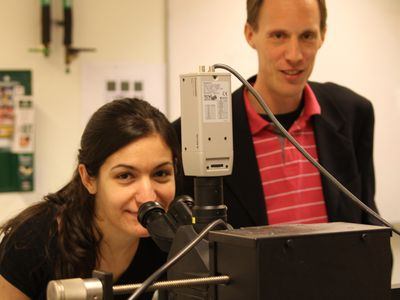This course introduces the most important semiconductor components that are used in the modern electronics. We focus on the MOS-transistor, pn and schottkydiodes and different types of memory cells. Furthermore, solar cells, photodiodes and light-emitting diodes are included. In the course, power consumption and gate delay in CMOS-based circuits are discussed. An overview is given of the development of so-called technology nodes for advanced CMOS according to Moore's law. You should be familiar with the process flow that is used to produce modern microelectronics. Strong emphasis is placed on sustainability aspects such as energy consumption and finite resources.
IL2240 Semiconductor Devices for Integrated Circuits 7.5 credits

This course introduces the most important semiconductor devices that are utilized in modern electronics. We focus on the MOS-transistor, pn- and Schottky diodes and various types of memory cells. We also cover solar cells, photo-diodes and light emitting diodes. In the course we discuss power and gate delay in CMOS-based circuits. An overview of the evolution of advanced technology nodes for CMOS according to Moore's law is provided. You will become familiar with the process and manufacturing flow that is used for modern microelectronics. A special focus is placed on sustainability aspects, including energy usage and limited resource supply.
Information per course offering
Information for Spring 2025 Start 14 Jan 2025 programme students
- Course location
KTH Campus
- Duration
- 14 Jan 2025 - 16 Mar 2025
- Periods
- P3 (7.5 hp)
- Pace of study
50%
- Application code
60664
- Form of study
Normal Daytime
- Language of instruction
English
- Course memo
- Number of places
Places are not limited
- Target group
Open to CELTE, CTFYS, TEBSM, TNTEM, CMATD, TTFYM
- Planned modular schedule
- [object Object]
- Schedule
- Part of programme
Degree Programme in Electrical Engineering, åk 2, Conditionally Elective
Degree Programme in Electrical Engineering, åk 3, Conditionally Elective
Degree Programme in Engineering Physics, åk 3, Optional
Master's Programme, Embedded Systems, åk 1, INEL, Recommended
Master's Programme, Nanotechnology, åk 1, NTEB, Conditionally Elective
Contact
Course syllabus as PDF
Please note: all information from the Course syllabus is available on this page in an accessible format.
Course syllabus IL2240 (Spring 2023–)Content and learning outcomes
Course contents
Intended learning outcomes
After passing the course, the student shall be able to
- describe the electronic band structure for insulators, semiconductors and metals qualitatively
- use the concepts electron- and hole-concentration, bandgap and mobility for calculations of current-voltage relations in semiconductor components
- analyse and calculate the internal electrostatics (charges, electric field and potential) in semiconductor components based on pn and MOS-structures
- describe the function and the application areas for the pn-diode, the MOS-transistor and common types of memory cells and some kind of semiconductor sensor
- describe the basic properties for CMOS-inverters and how these are used to implement integrated circuits.
- give an account of the most important sustainability aspects in production of modern microelectronics.
Literature and preparations
Specific prerequisites
Knowledge in electrostatics, 3.5 higher education credits, equivalent completed examination module TENE in EI1220 or completed course EI1320/HE1200.
Equipment
Literature
Examination and completion
If the course is discontinued, students may request to be examined during the following two academic years.
Grading scale
Examination
- LABA - Laboration, 1.5 credits, grading scale: P, F
- SEMA - Seminar, 1.5 credits, grading scale: P, F
- TENA - Written exam, 4.5 credits, grading scale: A, B, C, D, E, FX, F
Based on recommendation from KTH’s coordinator for disabilities, the examiner will decide how to adapt an examination for students with documented disability.
The examiner may apply another examination format when re-examining individual students.
Opportunity to complete the requirements via supplementary examination
Opportunity to raise an approved grade via renewed examination
Examiner
Ethical approach
- All members of a group are responsible for the group's work.
- In any assessment, every student shall honestly disclose any help received and sources used.
- In an oral assessment, every student shall be able to present and answer questions about the entire assignment and solution.
Further information
Course room in Canvas
Offered by
Main field of study
Education cycle
Add-on studies
Supplementary information
In this course, the EECS code of honor applies, see:
http://www.kth.se/en/eecs/utbildning/hederskodex